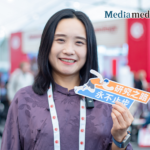
Editor's Note: The 2024 American Society of Hematology (ASH) Annual Meeting took place in San Diego from December 7 to 10, attracting the global hematology community's attention. As one of the most prestigious international events in the field, this conference has drawn keen interest from researchers and clinicians worldwide, including those in China. To provide timely updates on the most significant daily highlights, Oncology Frontier – Hematology Frontier launched the special column ASH Daily News Highlights. Hosted by Dr. Jun Zhu from Peking University Cancer Hospital, the column features daily expert interviews, offering firsthand insights into the conference. We were honored to connect with Dr. Huiqiang Huang from the Lymphoma Center of Sun Yat-sen University Cancer Hospital to discuss the latest research in lymphoma presented at the conference.Dr. Jun Zhu:Professor Huang, welcome! As we enter the second day of the conference, could you share with us some of the key findings in lymphoma research presented today?
Dr. Huiqiang Huang:Thank you, Professor Zhu. Today, December 8, I attended the lymphoma oral presentation session and noted four particularly significant studies. Let me share them with you one by one.
Study 1:
A Retrospective Analysis by the EBMT Lymphoma Working Group
This study retrospectively analyzed clinical data on autologous and allogeneic transplants registered with the European Society for Blood and Marrow Transplantation (EBMT) and its Asian partner centers from 2002 to 2022. It represents one of the largest datasets to date on transplantation outcomes in peripheral T-cell lymphoma (PTCL), with a median follow-up of 3.3 to 3.9 years.
Key findings indicate that both autologous and allogeneic transplants are effective in PTCL. Autologous transplants showed a better safety profile, while allogeneic transplants had lower relapse rates but higher transplant-related mortality. For patients in CR1 or CR2, autologous transplants were recommended due to comparable overall survival.
Interestingly, the study found that the efficacy of allogeneic transplants was consistent across first-, second-, and third-line therapies. However, patients with high tumor burdens still faced higher relapse rates even after allogeneic transplants.
Despite the rise of immuno-targeted therapies, these findings reaffirm that autologous and allogeneic transplants remain indispensable treatment options. In China, where PTCL is more prevalent, autologous transplants, in particular, merit attention. Future research should explore ways to enhance transplant outcomes through integration with novel therapies.
Study 2:
New Prognostic Scoring System by the PETAL International Collaboration Group
This large-scale study involved data from multiple countries and focused on NK/T-cell lymphoma and other PTCL subtypes. It introduced a new prognostic index for relapsed/refractory T-cell lymphoma (PIRT), incorporating six factors:
- Age > 60 years
- Primary refractory disease
- Non-AITL (Angioimmunoblastic T-cell Lymphoma) subtype
- More than one extranodal site
- Ki-67 ≥ 40%
- Absolute lymphocyte count below the lower limit of normal (LLN) at diagnosis
This scoring system integrates clinical indicators of tumor burden, biological behavior, and immune status, making it a practical and validated tool for risk stratification. It holds significant promise for guiding individualized treatment and advancing clinical research.
Study 3:
Real-World Outcomes of CAR-T Therapy from the CIBMTR Registry
This study from the Center for International Blood and Marrow Transplant Research (CIBMTR) evaluated liso-cel as a second-line treatment for relapsed or refractory large B-cell lymphoma (LBCL) in real-world settings. The results were impressive: among 128 patients with a median follow-up of 6.2 months, the overall response rate (ORR) was 84%, with a complete response (CR) rate of 68%. These findings were consistent with previous clinical trials such as TRANSFORM and Pilot.
The study also addressed safety concerns. Adverse effects like cytokine release syndrome (CRS) and immune effector cell-associated neurotoxicity syndrome (ICANS) were manageable. Importantly, both younger and older patients benefited from this therapy, underscoring its broad applicability.
In China, CAR-T therapy often begins at later treatment stages due to its recent market introduction. Nevertheless, it shows promising efficacy even in third- or fourth-line settings. The key challenge lies in identifying the optimal timing for CAR-T intervention in real-world practice, an area that warrants further discussion and collaboration.
Study 4:
Real-World Data on Bispecific Antibodies
This report explored the use of bispecific antibodies in patients who failed CAR-T therapy. Although CAR-T is often prioritized for relapsed second- or third-line treatments, bispecific antibodies serve as a critical salvage option for those who do not respond.
The study involved 64 patients from 14 academic institutions. The ORR was 54%, with a CR rate of 33%. However, the median progression-free survival (mPFS) was only 4.8 months, and the median overall survival (mOS) was 7.5 months. Outcomes were particularly poor in patients with high lactate dehydrogenase (LDH) levels, double-hit lymphoma, or those who relapsed within 90 days post-CAR-T. Once bispecific antibody salvage therapy failed, the mOS dropped to just over two months.
These findings highlight the need to integrate CAR-T and bispecific antibodies earlier in treatment to improve outcomes. Early clinical research targeting this population is urgently needed.
Dr. Jun Zhu:
Thank you, Professor Huang, for this comprehensive update. From traditional transplantation approaches to new prognostic tools, and the latest in CAR-T and bispecific antibody therapies, these studies offer valuable insights for clinical practice and future research. They also signal a new era of hope for lymphoma patients. Once again, thank you for sharing these groundbreaking findings with us.
Expert Profiles

Director, Lymphoma Center, Sun Yat-sen University Cancer Hospital
Distinguished professor and accomplished researcher, with numerous publications in top journals such as JCO, Lancet Oncology, and Nature Medicine.

Chair, Department of Lymphoma, Peking University Cancer Hospital
Renowned expert in lymphoma, serving in various leadership roles within national and international oncology associations.


